“Cliffs of Freedom”: A Historical Drama Set in Greece, Blending Ageless Themes of Hope, Love and Sacrifice
“Cliffs of Freedom” is the story of an ill-fated romance between a young Greek village girl and a conflicted Turkish officer during the dawn of the Greek War for Independence against the Ottoman Empire in 1821. Twenty-year-old Anna Christina is smitten by Colonel Tariq, a rising star in the Turkish army who has growing doubts about his countrymen’s brutal methods of governance, and who had once spared her life on a cliff-top when she was a child… but their budding romance brings tragedy to her family and her village. Swearing revenge against the Turks, Christina joins the Greek rebellion and inadvertently becomes a local symbol of the Greek resistance movement, inspiring her countrymen and attracting the ire of the Ottomans, who place a bounty on her head. Having believed that she could leave her feelings behind, Christina must face off against the man who still loves her and wants to keep her safe, but who has now been tasked with her capture. Their encounters and skirmishes inevitably lead to a tragic confrontation during a pivotal battle between the Greeks and Turks that will change the course of history.
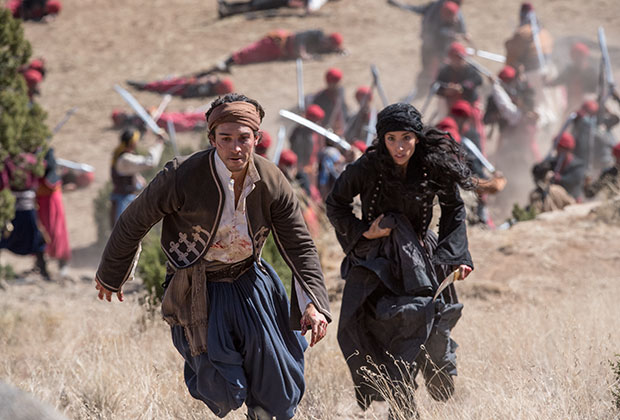
The movie blends ageless themes of hope, love and sacrifice with a timely narrative about one woman’s struggle to overcome oppression and shape her own destiny. An epic adventure in the tradition of Dr. Zhivago, Braveheart and The Last of the Mohicans, the film leverages historical context to pose contemporary questions about the meaning of family, the limits of patriotism, the dangers of intolerance and the price of freedom.
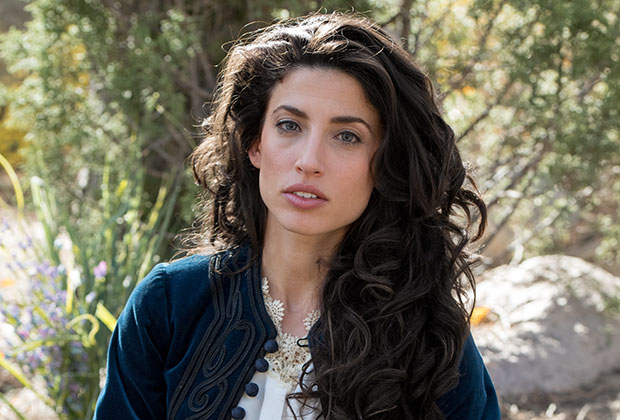
“Cliffs of Freedom” represents a true passion project for Executive Producer and Co-writer Marianne Metropoulos, who spent several years developing a story that would bring the Greek war for independence alive for modern audiences. “As a proud Greek-American,” explains Metropoulos, “I wanted to produce a feature film depicting Greece’s fight for freedom after 400 years of occupation by the Ottoman Turks. This pivotal period in Greece’s history is less known to many, and it tells of the Greek’s commitment and perseverance to achieve freedom or choose death rather than to live enslaved.”
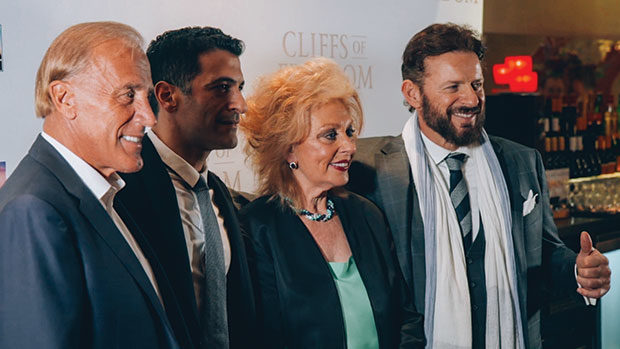
Executive Producer and Co-Writer Marianne Metropoulos with husband C. Dean Metropoulos and sons Evan & Daren at the film’s premiere in London
Times of great societal and industrial change are often accompanied by political upheaval. By 1820, the Greeks’ struggle for freedom was coming to a head after centuries of oppression. The peoples of western countries were becoming increasingly well-educated and exposed to other cultures and societies. In contrast, the Ottoman Empire was clinging to power by doubling down on the same attitudes and methods they had employed for centuries. With the Turkish military forces spread thin and growing more intolerant as they faced growing uprisings all over the Empire, Greeks longing to be a real nation again sensed that change was near and inevitable.
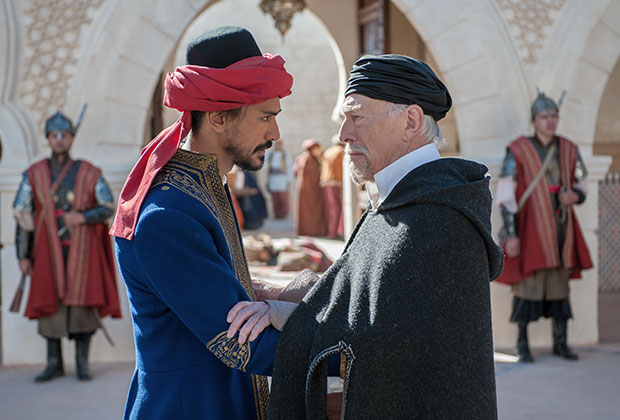
Alas, desiring change and bringing change are two different things. When cultural traditions become the chains that hold back progress, the question soon becomes: what are we willing to sacrifice for our beliefs? “The two most important elements of my story,” says Metropoulos, “are the love and loyalty given to family; to honor their memory even at the cost of one’s own future happiness, and to realize and accept that even historic enemies can bridge religious, cultural and language differences which separate and drive hatred and war.”
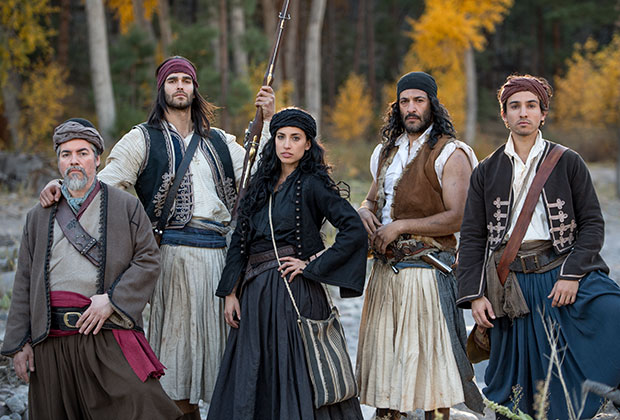
Following the lengthy script development period, Metropoulos enlisted a seasoned team of entertainment industry talents to realize the sweeping story as a feature motion picture in the classic Hollywood tradition. “After meeting with various producers,” she says, “I found a producing partner in Casey Cannon, who had the experience, ability, determination, and shared the vision that I had, to bring this story to the screen.”

Along with veteran producer Cannon, the production brought aboard co-writer and director Van Ling, whose over 30 years’ experience in movies, including nearly a decade working with legendary filmmaker James Cameron, made him uniquely suited to translate Metropoulos’ story into a compelling film narrative. “I was impressed with Van’s command of storytelling,” she says. “Along with his visual ideas and his many years of experience in the film industry, I appreciated his enthusiasm for the project and his understanding of how I wanted the story to be portrayed on film. I credit both Casey and Van with bringing my ‘passion project’ to life.”
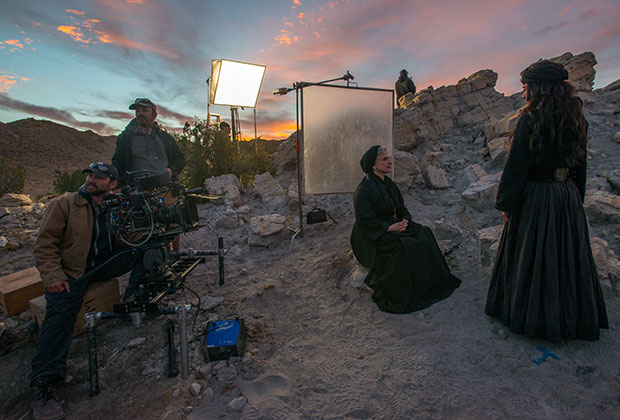
“One of the things that drew me to “Cliffs of Freedom” was the opportunity to do something different,” says Ling. “When modern audiences think of Greek portrayals in movies it’s usually in terms of ancient gods or Spartans battling it out, or as a family-centric comedy a la My Big Fat Greek Wedding or Mamma Mia. Other than a few pictures made specifically for the Greek cinema, the critical period of the 19th century hasn’t been explored to any significant extent. As a filmmaker, it was my goal to do so in a way that would be compelling and accessible to both Greek and international audiences.”
Cannon agrees, pointing out that “our characters span both sides of the cultural divide between Greeks and Turks. To varying degrees they struggle with the same issues we all do: innocence vs. naiveté, selflessness vs. selfishness, love vs. hatred, trust vs. suspicion, faith vs. superstition, loyalty vs. betrayal. Like in real life, our characters are layered with doubts and contradictions that make them vulnerable and human.”
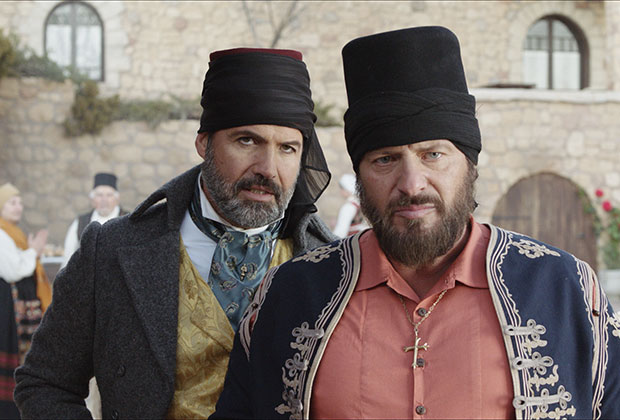
Can a younger generation see with better eyes than their elders, breaking free of ingrained cultural fears and biases in order to inspire those around them in a positive way? The filmmakers are optimistic. “At the end of the day, the things we have in common are more impactful than the things that drive us apart,” says Ling. “When you can find a common humanity between peoples, you can rise above the cultural hatreds that sometimes get passed down. It’s an enduring theme, and one that we hope resonates strongly with contemporary audiences.” Metropoulos agrees. “Appreciating those differences can ultimately enrich all of us.”
On a similarly timely note, “Cliffs of Freedom” features a strong, emotionally complex woman protagonist whose struggle to navigate a predominantly male- centric culture will seem particularly relevant to female audiences. “Although the #MeToo movement has raised important questions about the role of women in contemporary society,” says Cannon, “it was important to depict (protagonist) Anna Christina not as an anachronistic, post-feminist character, but as a real human being both bound and elevated by cultural traditions. She starts the film as one kind of icon in her Greek village and evolves into an entirely different kind of symbol through tragedy – but she refuses to be limited by those boundaries or to be a victim of her circumstances.”
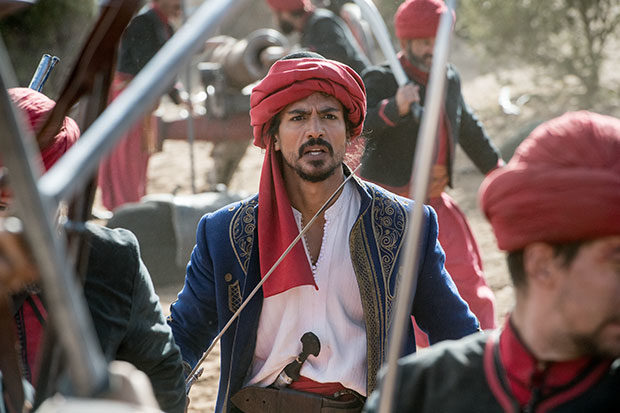
Equally important to the filmmakers was the diversity of the male characters and their reactions to the female characters as the latter grow and change. “We wanted to present a spectrum of male response,” says Ling, “from the men who stereotypically see women as property, to those who grudgingly treat women with traditional but unequal respect, to those who are secure enough to welcome a brighter, more balanced and inclusive future for Greek society at large.” Accordingly, “Cliffs of Freedom” features a diverse cast combining new talents like Tania Raymonde, Jan Uddin and Raza Jaffrey with legendary performers such as Tony®-award-winning actress Patti LuPone (Evita) and Oscar®-winning actor Christopher Plummer (All the Money in the World, The Sound of Music). In addition, the picture showcases several actors of Greek descent, including Billy Zane, Simon Kassianides and Costas Mandylor.
“Our younger cast is very active on social media, with many fans among millennials who can relate to the notion of younger generations wanting to stand up against outdated traditions to create a better world,” says Ling. “We’re also fortunate to have seasoned icons like Patti LuPone and Christopher Plummer, who can appeal to those folks longing for ‘a good story well told’ in the classic Hollywood sense.” Cannon agrees. “Under Van’s direction, the cast brought our passionate, multi-layered characters to life in a way that’s compelling and believable; the women are strong, the men are courageous and both the heroes and the villains are complex and conflicted.”

Although “Cliffs of Freedom” is a historical drama set in Greece, the film represents a uniquely American production. Shot almost entirely in New Mexico, it features an international cast and crew. “The goal,” says Ling, “was to keep the bulk of the production work in the United States while portraying a relatively modern period of Greek history in a way that would be accessible to contemporary American audiences.” In its own indie-film way, “Cliffs of Freedom” is meant be seen as an homage to classic Hollywood epics like Lawrence of Arabia and Gone With the Wind. “The Greeks are a proud and passionate people,” Ling notes, “so it felt fitting to match that level of drama to capture the spirit of Greece in that period in history.” As Cannon observes, “In our post- modern culture of self-reference, cynicism and irony, a more traditional ‘Hollywood’ approach distinguishes our story as something refreshing and unexpected.”
Filled with romance, emotion, tragedy, epic battles and true patriotism, “Cliffs of Freedom” is a sweeping adventure that captures the spirit of Greece during a tumultuous time in its history.
The movie was released on March 1. Look for it in theaters near you.















0 comments